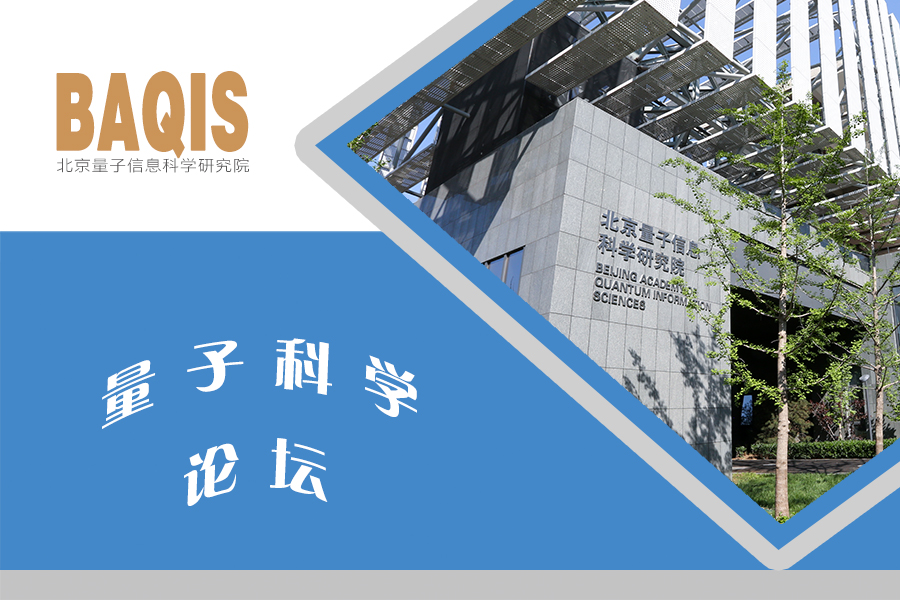BAQIS Quantum Science Forum 38: Exchange with JD Explore Academy Scientists
2021/05/20

Time:May 20 2021, 14:00-16:00
Venue: Room 526
Tencent Meeting ID: 990519091
Password:0520
Title:Exchange with JD Explore Academy Scientists
Host:Mengjun Hu, Associate Research Scientist, BAQIS
Presentation 1: Exponential speedup with quantum reinforcement learning
Abstract:
Over the past decade, development in quantum computing technologies has reached the point where the dominance of classical computing is severely threatened. In 2019, the 53-qubit Sycamore chip demonstrated a sampling task which will take classical super computer thousands of years to accomplish. And just weeks ago, quantum walk was successfully demonstrated on the China based 62-qubit programmable Zu Chongzhi quantum chip. These results lead us to think the possibility of realize some of promising quantum algorithms in the foreseeable future. Quantum machine learning, indicated by its name, in one of the example that may fundamentally change how artificial intelligence works nowadays. Quantum exponential speedup has been proven previously in supervised or unsupervised learning. Here, we explore the speedup brought by quantum to reinforcement learning. For the first time, we prove that an exponential speedup can be achieved with quantum reinforcement learning. We believe that this result will encourage more research in the direction of quantum reinforcement learning and also quantum machine learning.
About the Speaker:
 Xingyao Wu, Ph.D., quantum algorithm scientist at JD Explore Academy. He obtained his Ph.D. degree from the Centre for Quantum Technologies of Singapore, under the tutelage of Professor Valerio Scarani in 2017. From 2017 to 2019, he worked as a postdoctoral fellow in the Jacob M. Taylor group of QuICS Quantum Computing Center in Maryland, USA. He joined JD Explore Acadamy in 2021. Mainly engaged in research areas such as quantum machine learning algorithms and applications, quantum entanglement theory and quantum device verification, analog quantum computing, etc.
Xingyao Wu, Ph.D., quantum algorithm scientist at JD Explore Academy. He obtained his Ph.D. degree from the Centre for Quantum Technologies of Singapore, under the tutelage of Professor Valerio Scarani in 2017. From 2017 to 2019, he worked as a postdoctoral fellow in the Jacob M. Taylor group of QuICS Quantum Computing Center in Maryland, USA. He joined JD Explore Acadamy in 2021. Mainly engaged in research areas such as quantum machine learning algorithms and applications, quantum entanglement theory and quantum device verification, analog quantum computing, etc.
Presentation 2: On exploring practical potentials of variational quantum algorithms with advantages
Abstract:
Quantum computation has seen rapid development in the past years. A representative milestone is Google’s quantum supremacy experiment on a 53-qubit superconducting quantum processor. Driven by the progress of quantum fabrication techniques, increased efforts have been made to apply noisy intermediate-scale quantum (NISQ) machines to accomplish practical tasks with computational advantages. Variational quantum algorithms (VQAs), which include quantum neural networks (QNNs) and variational quantum eigensolvers (VQEs), are promising candidates to achieve this goal. In this talk, we will first discuss the capabilities and limitations of VQAs from the view of optimization theory and learning theory. To enhance the learnability of VQAs, we will next exhibit a quantum architecture search scheme to automatically seek an optimal ansatz, which well balances the tradeoff between expressivity and trainability encountered in VQAs. Last, we will elaborate on the possibilities to use quantum kernels instead of QNNs to pursue computational merits in the NISQ era.
About the Speaker:
Yuxuan Du, Ph.D., quantum algorithm scientist at JD Explore Academy. Obtained a Ph.D. from the Department of Computer Science at the University of Sydney, under the tutelage of Professor Tao Dacheng. The main research interest is quantum machine learning, including but not limited to the magical NISQ algorithm design, and theoretical analysis of the capabilities and limitations of quantum learning models.
 中文
中文 Email
Email QCloud
QCloud Log in
Log in
